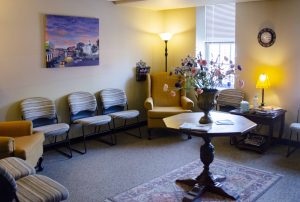When Miss Ole Miss Jessica Tran saw the screenshot during winter break, she was immediately disheartened. She was texting Nakiyah Jordan about going to the University Counseling Center (UCC), and Jordan sent back a screenshot from the UCC website — a bold, red notice at the top of the page.
“EFFECTIVE JANUARY 2, 2019: The UCC will initiate a new session limits policy for individual counseling (10 per academic year per student). For further information see the “Services” tab above. If you have questions regarding this new policy, please feel free to contact us.”
Jordan had just started going to the UCC when she saw the notice.

Photo by Parker Galloway
“It just felt like I’m trying to do better for myself, but now I can’t go as frequently. It just felt sort of discouraging,” she said. “I was making an appointment, which takes a lot for me, and then I saw on the website that there was the new rule. I thought, ‘Well, I’m not going to use this now, because I should save (the appointments).’”
When Tran, who is the president of Active Minds, returned to campus, she met with UCC director Bud Edwards to learn about why the policy was in place. She did not want to be angry — she wanted to understand. Edwards explained that he was focused on striking the correct balance of the number of patients who can be treated and the quality of care they receive.
“We are trying to treat students’ needs adequately, and at the same time treat as many students as possible,” Edwards said in an interview with The Daily Mississippian. “We’re going to see if that will satisfy these two competing demands for quality of care and number of students we see.”
Edwards said students who need more than ten sessions have other options. All students have access to unlimited group therapy, as well as referrals to treatment centers in the area and other on-campus treatment options. However, he said other on-campus treatment centers are increasingly experiencing demand over their capacities.
Edwards said students who need more than ten appointments will be considered on a case-by-case basis, with a focus on ensuring their care is affordable and appropriate.
Edwards explained that the counseling center staff has been considering this policy for nearly two years, since extensive waitlists began accumulating. He said there was no administrative pressure to make the decision.
By collecting national and local data, the UCC staff said they found that 85 percent of students use fewer than 12 sessions in the course of treatment, and the average college student will only use five or six sessions.
Edwards also said 40 percent of the student body uses three or fewer sessions. This has caused the UCC to focus on short-term treatments for students. He said this policy was tailored to the needs of the student body, like previous policies of charging $20 for missing an appointment or cancelling within two hours of the appointment.
Edwards plans to test run the policy for approximately one year before deciding how to move forward. He said he is unsure of the policy’s full effects but plans to collect data and compare it to previous semesters.
Edwards said demand is simultaneously rising alongside cases of depression and anxiety at Ole Miss and other universities, while the stigma of talking about mental health is dissipating. To prevent future cases and encourage dialogue surrounding mental health, the university has funded more than just counseling.
“The mental health conversation has gone beyond therapy now,” Vice Chancellor for Student Affairs Brandi Hephner Labanc said. “We want to look at mental health in a broader way.”
The William Magee Center for Wellness Education has recently expanded, and the UCC now offers classes for stress management and meditation.
Edwards said the UCC is “about halfway” to where he wants it to be, and he has requested more counselors and more space. He said the administration has been responsive to his requests.
Still, the wait times can cause students to either wait weeks for an initial assessment or reject treatment entirely. The UCC is “pretty close to the bottom” of the SEC in terms of funding, according to Edwards. Other SEC schools have similar policies to limit individual counseling sessions available to students, which led to the UCC creating the new policy.
“My opinion is that there is a minimum threshold as far as treating mental health on a campus that is necessary to handle the needs of a community,” Edwards said. “We aren’t there yet, but the administration is helping us get there.”
Since becoming the director, Edwards has put in requests to the Division of Student Affairs for more staff and space. Those requests are considered and investigated, and an evidence-based report is then passed on to the Office of the Provost where the final decision is made, according to Hephner Labanc.
“It’s not that we don’t want to support something. It’s that we can’t,” Hephner Labanc said. “It could be better but I don’t think it’s bad at all.”
Some students think the progress is not fast enough.
“Provost Noel Wilkin, I think he puts (mental health) as a priority. He has the campus’ best interest at heart,” Tran said. “But you can look at the numbers, and I almost think the numbers speak for themselves. They can do better.”
Jordan also believes the university’s focus should shift toward mental healthcare on campus more quickly than it has.
“I understand that the demand gets high, but I also think it would be great if this university would do more for the counseling center, as in hiring more people (and) moving it to a different building at a more convenient location,” Jordan said. “I wish the university would show us that they also care about our mental health.”






